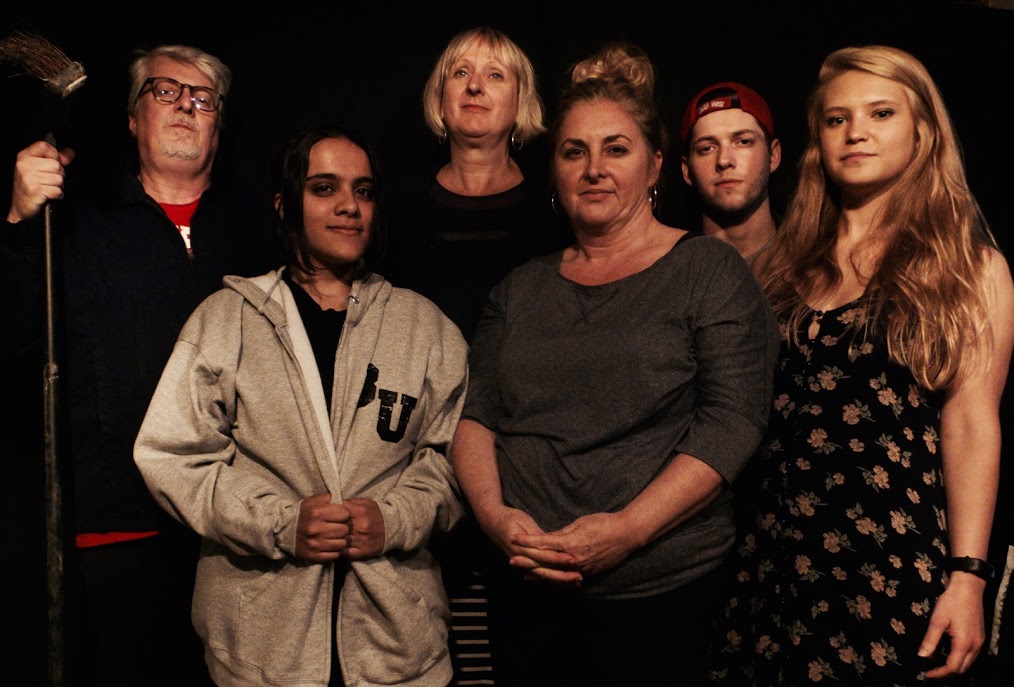
The cast. Photo: Avenue Stage
Presented by Avenue Stage
By Judith Austin
Directed by Michael O’Halloran
Boston Playwrights’ Theatre
949 Commonwealth Ave.
Boston, MA 02215
Avenue Stage on Facebook
AddictShunned was originally titled Spiro Spero, which roughly translates to “While I Breathe, I Hope.”
Review by Kitty Drexel
“Addiction is defined as a chronic, relapsing brain disease that is characterized by compulsive drug seeking and use, despite harmful consequences. It is considered a brain disease because drugs change the brain; they change its structure and how it works. These brain changes can be long lasting and can lead to many harmful, often self-destructive, behaviors.”
— NIDA website, “The Science of Drug Abuse and Addiction: The Basics” https://www.drugabuse.gov/
(Boston, MA) Addiction is as much of a disease as Diabetes. Yet, while we don’t demand diabetics to will themselves healthy, we do demand this of addicts. Addicts need and deserve compassion, understanding, and resources to break the cycles of abuse. Avenue Stage’s AddictShunned compassionately reframes the stories of addicts. The audience is made to find commonality with characters it would prefer to remain anonymous.
These are stories from Judith Austin’s experiences as a healthcare provider in Boston’s acute detoxification units. To paraphrase wildly, she works with addicts while they are in midst of detoxification so to assist them towards mental and physical stability. In AddictShunned we meet five patients in various states drug abuse, and one lawfully evil prescriber. It’s the kind of play that will make you laugh from your belly even as you’re questioning why you’re laughing at all.
Avenue Stage’s production had a rough start on July 12, but the cast found a steady pace once their audience settled into their seats. The cast gives a spirited performance; they educate as they entertain. AddictShunned’s subject matter is sensitive but Eunice Simmons, Bridget Haberecht, and Miss Mary Mac gave us reason to laugh. Saloni Kumar and Geoff Pingree reminded us not to laugh too hard lest we forget why we were in the theater. Joel Derby and Megan Ward made their fictitious realities all too relatable.
O’Halloran’s staging is simple but his direction has hidden depths. It is clear within minutes that his work with the cast moved past basic understanding of premise and plot. These characters are people we’ve seen on the street even if we’ve never met them. Getting to know them means reconsidering how we treat strangers outside the theatre after the show has ended.
Austin’s writes with a voice mature enough for adults but with a witty sincerity that teens may appreciate. As a script, AddictShunned is the appropriate length, cast size, and schematic design for a touring production. It would suit an inpatient treatment center, a high school auditorium or even a correctional facility as an in-house development project. It has the same potential as the work featured in the Eve Ensler documentary What I Want My Words To Do To You. Local actors take note because it has both serio-comedic monologues for every age and gender.
Addicts are people. AddictShunned’s message is that simple: addicts are people with families, histories, hopes and dreams like the rest of us. They could be us; we could be them. Twists of fate are what separate us. In the case of the character Spiro (Pingree), hard work, goodwill and resilience are what bridged the divide. If AddictShunned teaches us anything, it should be that we shouldn’t reject a person based on outward appearances. Disease has the potential to affect anyone. Compassion is the only option.
While I have your attention, the opioid epidemic is one of the only crises that the White House appears to be taking seriously. Massachusetts’ citizenship is hit particularly hard. It behooves us all to learn the signs of an overdose. If you see someone that may be suffering from one, please don’t wait for someone else to notify the correct authorities to request an ambulance for medical assistance (911 or University emergency services). Police are not trained in medical procedure, do not carry naloxone, and may make the situation worse if the victim is a person of color. Please learn from the police assault on a Black Harvard student last April and do not call the police.
